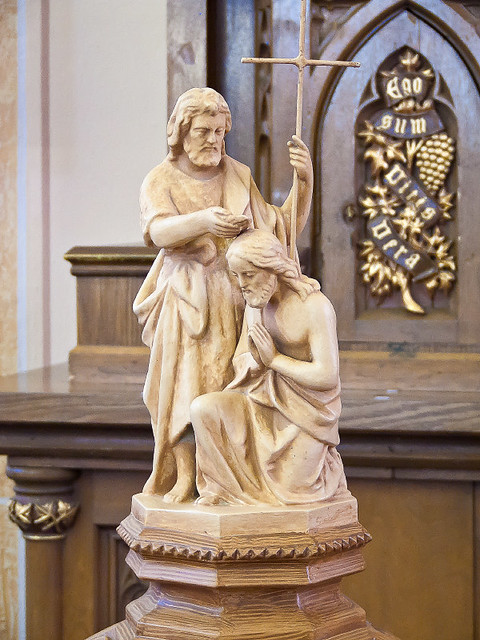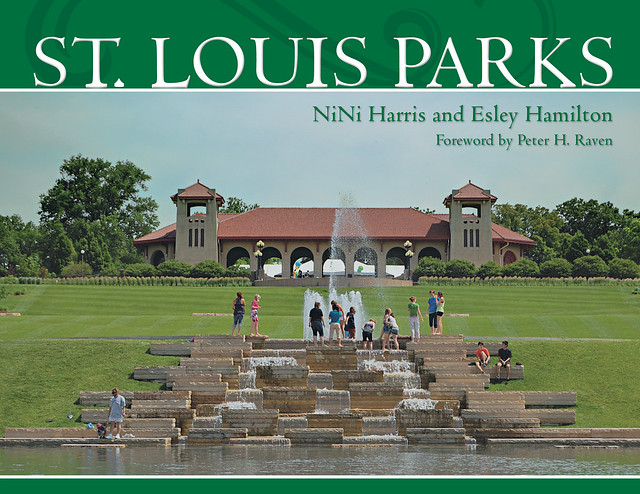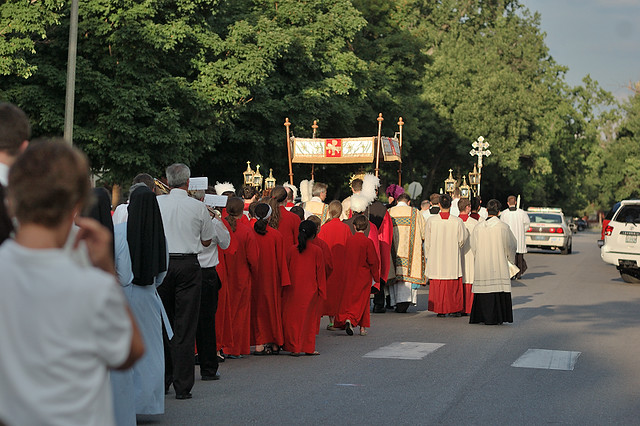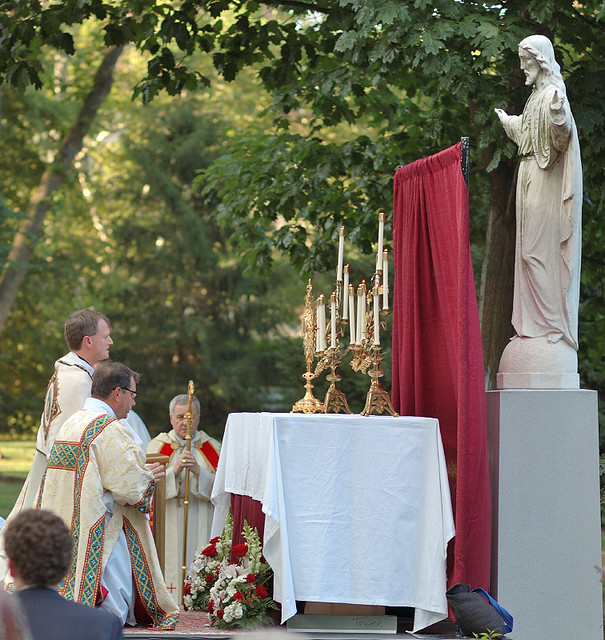ON TRINITY SUNDAY of 2003, I entered into the Church, at Saint Gabriel the Archangel Church, in Saint Louis, with my first Confession, Confirmation, and Communion. I have a special fondness for that feast day.
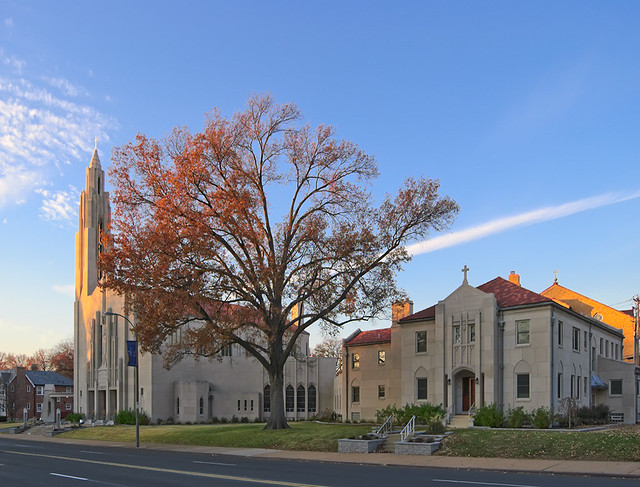 Saint Gabriel the Archangel Church.
Saint Gabriel the Archangel Church.
But alas! Many Catholic humorists call this feast day ‘Heresy Sunday,’ because of the wide variation of explanation of the
Most Holy Trinity heard from pulpits. Well, it is a difficult doctrine, hard to even begin to understand, and even the great Saint Patrick, evangelist of Ireland, perhaps got the doctrine wrong with his clover leaf.
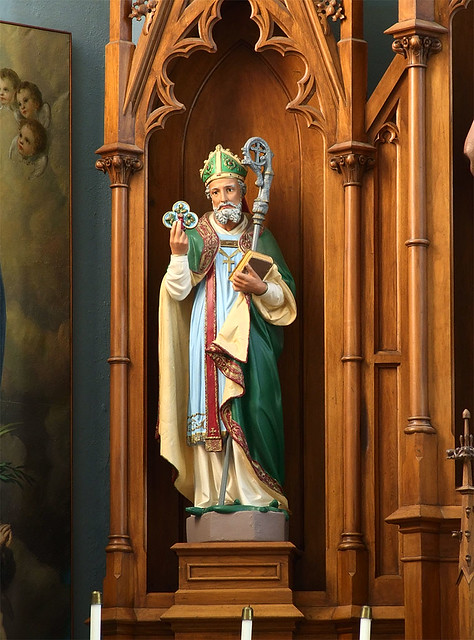 Saint Patrick, with cloverleaf-shaped symbol of the Trinity, at Saint Joseph Church, in Chenoa, Illinois.
Saint Patrick, with cloverleaf-shaped symbol of the Trinity, at Saint Joseph Church, in Chenoa, Illinois.
While we sometimes hear odd, even heretical explanations of the Trinity, another view is that the Most Holy Trinity is a mystery. We find a bit of this in the Catechism of the Catholic Church (1997):
237 The Trinity is a mystery of faith in the strict sense, one of the “mysteries that are hidden in God, which can never be known unless they are revealed by God“. To be sure, God has left traces of his Trinitarian being in his work of creation and in his Revelation throughout the Old Testament. But his inmost Being as Holy Trinity is a mystery that is inaccessible to reason alone or even to Israel's faith before the Incarnation of God's Son and the sending of the Holy Spirit.
This is true, and the Catechism also
draws from many other threads of the Church’s thought over the millennia. This mystery can be
likened to navigating through a fog — fog veils our senses, and so if we want to reach our destination, we must trust our roadmap; likewise, if we want to reach our heavenly destination, we must trust revelation even though our interior sense of our intellect is likewise veiled. Because “we see through a glass darkly,” many think that an understanding of heavenly things is unimportant, and that we ought to instead concern ourselves with only worldly things. Rather, I think, this means that the spiritual life can be difficult, because our vision is clouded. We still must urgently try to reach our destination whether or not the fog meets our own personal standards for transparency.
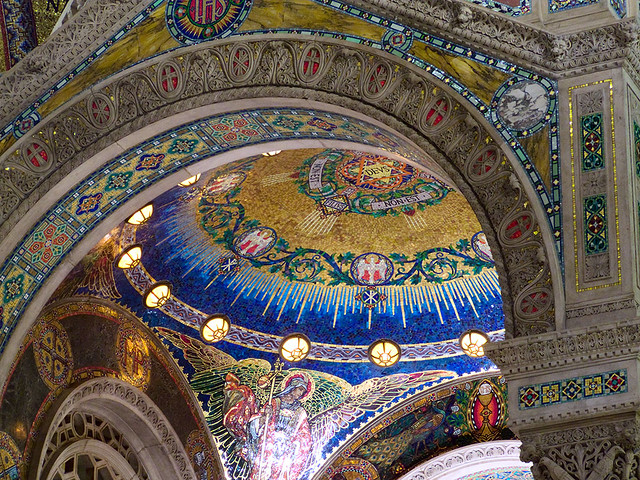 A symbol of the Trinity is found above the altar at the Cathedral Basilica of Saint Louis. This formulation is found in many traditional baptismal fonts.
A symbol of the Trinity is found above the altar at the Cathedral Basilica of Saint Louis. This formulation is found in many traditional baptismal fonts.
Nominalism is a philosophy, very sophisticated and very common today, that typically is said to have been invented in about the late middle ages, but which can be traced back to the Fall of Man. Nominalism, in its most extreme form, states that any two objects with the same name share nothing in common with each other except for their name. I have several cats, and a strict nominalist will say that they have nothing in common with each other, and even will reject the notion that they
resemble each other in any way, even though they all look like cats to me (and likely to anyone else who sees them). This is almost complete skepticism, for it ultimately rejects both reason and experience. It is easy being a skeptic, and we can say that this philosophy is a roundabout way of justifying lying. Skepticism is not always wrong, but we should not throw the baby of truth out with the untruth of the dirty bathwater.
Nominalism was the philosophy of Luther and of many in the Reformation, this being common in Catholic schools after the devastation of the Black Death, which killed off most of the scholars of the Medieval period. We can see how taking this philosophy to its bitter end is harmful, especially in relationship to the doctrine of the Trinity, but also when it comes to all rational thinking. Most Protestant denominations, even those who preach the Bible alone, do accept the doctrine of the Trinity. But those who trusted the philosophical foundations of the Reformation more than revelation came to the false conclusion that the Trinity is three gods, and rightfully found this repugnant. They rejected revelation and instead turned to unitarianism, leading some eventually into agnosticism or athieism. We find this in Islam, whose adherents sometimes call us ‘polytheists,’ perhaps for similar philosophical reasons.
But traditional Christian philosophy tells us of a great, invisible, underlying unity in ultimate reality, which has its source in a spiritual, nonmaterial reality, which ultimately derives from God, Who is one and undivided yet Triune. Oddly enough, it was pagan philosophers who wrote down much of this philosophy, although Jewish theologians tell us that this line of thinking also came down to us through orthodox Jewish oral tradition. Some Fathers of the Church,
such as Saint Justin Martyr, Saint Augustine, and Saint Ambrose, tell us how this good philosophy helped them understand certain aspects of revelation.
We even find an underlying unity in the material world. While a strict nominalist may say that each cat is an absolutely unique individual having nothing whatsoever to do with each other besides the name ‘cat,’ he may also say that each cat is merely made up of atoms, thinking that this explains everything. But we can
prove experimentally (as well as derive from accepted theory) that the elementary particles that make up atoms are
indistinguishable in principle: all electrons absolutely share in a
single electron nature, and so strict nominalism cannot be true. And what goes for elementary particles must also go for cats and humans, although certainly to a less obvious degree due to complexity.
There is an underlying unity, even found in the material world, which extends upwards to the spiritual realm and towards God, and I think that this mystical unity, although mysterious to us, helps us to better explain the Trinity.
The Anglican writer, Dorothy L. Sayers (1893–1957), wrote an excellent book,
The Mind of the Maker (1941), which compares mistakes or conceits in writing fiction to heresies in Trinitarian doctrine. Going through the Creeds of the Church, Sayers shows how well-known heresies, which deny one or another of the clauses of the Creeds, correspond to specific errors in writing, which produce unsatisfactory results. This method is justified by the goodness of God, Who made us in His Image and Likeness. As Sayers wrote
“The Christian affirmation is, however, that the Trinitarian structure which can be shown to exist in the mind of man and in all his works is, in fact, the integral structure of the universe, and corresponds, not by pictorial imagery but by a necessary uniformity of substance, with the nature of God, in Whom all that is exists.” I recommend this book because it is both instructive and entertaining, especially for writers.
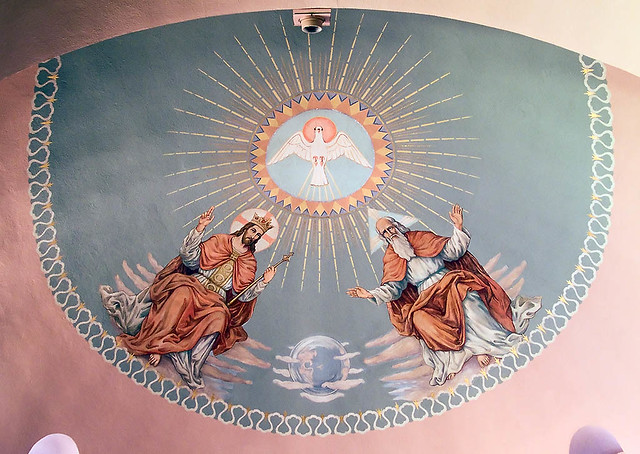 A symbolic, and non-literal, representation of the Trinity, painted above the sanctuary, at Sacred Heart Church, in Crystal City, Missouri. This nevertheless has archetypal truth, useful to the human imagination. Photo taken in October, 2007.
A symbolic, and non-literal, representation of the Trinity, painted above the sanctuary, at Sacred Heart Church, in Crystal City, Missouri. This nevertheless has archetypal truth, useful to the human imagination. Photo taken in October, 2007.
It’s been said, humorously, that one cannot write about the Trinity without being a material heretic. I hope I haven’t written too much heresy here! Enjoy your Sunday!


